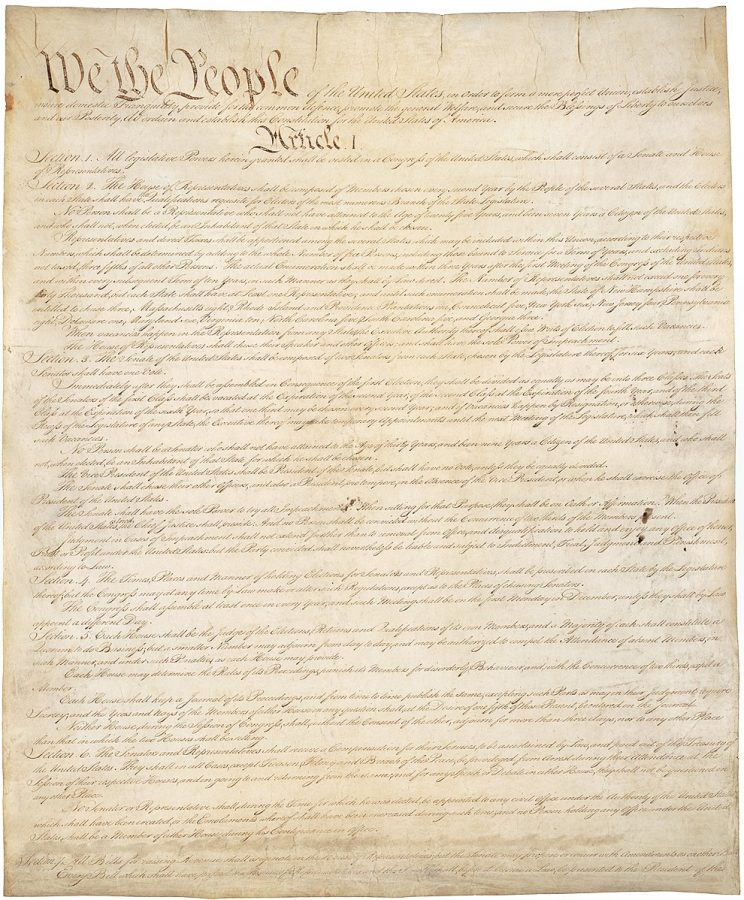America’s downfall: Distrust in the federal government
Photo courtesy Wikimedia Commons
The United States Constitution establishes a federal government of three branches, each with its own checks against the others.
With public trust in the federal government at a low point according to pewresearch.org, the question of whether it should be trusted is the most important one facing America today.
Those in favor of less trust in the government cite the potential for an authoritarian system as a reason for their position. Outside the U.S, there are examples of such a system in place, including Russia, China, and North Korea. None of these countries have a good track record with human rights and rights violations continue today.
All of these countries function as one-party governments. As such, there is little accountability in these governments, leading to corruption. People who distrust the government worry that trusting the federal government too much may lead to such a state; they believe that more trust would allow an increase in the government’s power. With past abuses of power, this is not entirely unjustified.
For instance, on May 2, 1927, the Supreme Court upheld a Virginia law that allowed the sterilization of people deemed “socially inadequate” in the court case Buck v. Bell (1927), according to eugenicsarchive.ca. As a result of past rights abuses such as government-sanctioned sterilization, they argue that the government doesn’t always have the people’s best interests at heart, and therefore a measured amount of distrust in the government is necessary to uphold civil liberties.
However, these reasons stem from a lack of understanding on how the government functions. The American government is made up of a system of checks and balances that are designed to prevent the centralization of power or a one-party government.
The government, at the highest level, is made up of three branches: the executive, the legislative and the judicial. This system of three branches was put into place by the Founders as a way of diluting the power of the federal government so that no one branch, if dominated by a single party, can hold power over the majority of the government.
For example, let us assume that the Democrats are the majority in both the House and the Senate, and therefore hold the legislative branch. Let us also assume that the president, and therefore the top level of the executive branch, is Democratic. If the House and the Senate were to pass legislation that was blatantly unconstitutional and the president were to sign it into law, there is no guarantee that the law will stand.
This is because of a check that the judicial branch places on both the legislative and executive branches. If this unconstitutional law were to go into effect, a citizen can sue the government in federal court, and eventually get to the top of the judicial branch: the Supreme Court. The Supreme Court has the power to nullify this law based on its lack of constitutionality, thus limiting the power of the other two branches.
This check, along with others, limits the power of any one branch in government, thus preventing a one-party system, as seen in the three aforementioned countries.
These checks and balances extend to the American people as well, as seen in the Supreme Court’s decision in Skinner v. Oklahoma (1942). In this case, a man named Jack Skinner was convicted multiple times of robbery and robbery with firearms, thus making him eligible for sterilization under Oklahoma’s Habitual Criminal Sterilization Act (law.cornell.edu).
The man claimed that this act violated rights guaranteed by the 14th Amendment. He appealed his case until it reached the Supreme Court, where he won. The verdict of this case outlawed eugenics as a punitive measure.
This brings me to my next point: people’s distrust in the federal government is based on a fundamentally flawed view of the relationship between the government and the people. The people have the power to influence the government at any point in time, whether that be voting in elections, petitioning for a certain policy or running for office themselves.
Another prominent example would be the Freedom of Information Act (FOIA). Under this act, federal agencies are required to share any information requested, unless it falls under one of nine exemptions that protect personal privacy, national security or law enforcement (foia.gov). This places each citizen in a position of power over the federal government, proving that citizens are not as powerless as distrustful individuals might conclude.
Additionally, “trust is the foundation for the legitimacy of public institutions and a functioning democratic system. It is crucial for maintaining political participation and social cohesion,” according to oecd.org. Essentially, it is the citizens’ trust and faith in the government that makes the government able to govern the population.
Furthermore, “when citizens lack trust in each other and institutions, they are less likely to comply with laws and regulations, pay taxes, tolerate different viewpoints” (ssir.org). Simply put, trust is the fabric that holds society together; without it, there would be anarchy.
For Americans, politics is seen as “hostile territory,” and like there is a “‘lack of reasoned discussion and debate’” (thepolicycircle.org). As a result, they are less likely to get involved in politics. This is the core of the problem in America, and it leads to the aforementioned misconception. When politics becomes taboo, there is a lack of public participation in politics, and as a result, the government becomes much less representative of the people.
This creates a rift between the government and the people, leading to an “us versus them” attitude from the people towards the government and dissolving the essential trust needed in the government-people relationship.
Trust is completely necessary and essential to the integrity of not only the government but of American society in general. As such, to not trust the federal government is equivalent to not supporting the society that made you. Yes, it has flaws, but these flaws can be addressed with a general commitment to improving the government and the country.
Thus, citizens should take on the responsibility that comes with being a citizen of this country through widespread public participation in both local and national governments.
Your donation will support the student journalists of Thomas S. Wootton High School. Your contribution will allow us to purchase equipment and cover our annual website hosting costs.








Catharine Harris • Dec 24, 2021 at 11:20 am
Your grandmother shared your well-written letter to our World Affairs Discussion Group. Many of us said it is past time to teach civics. Your letter made many of us hopeful about the future of our democracy. Thank you. Catharine Harris